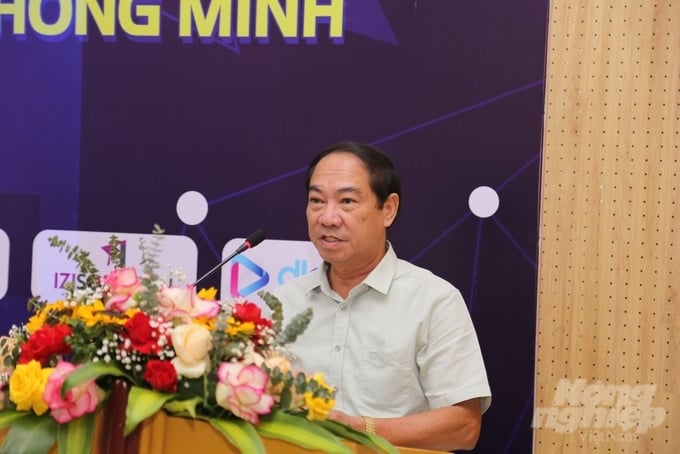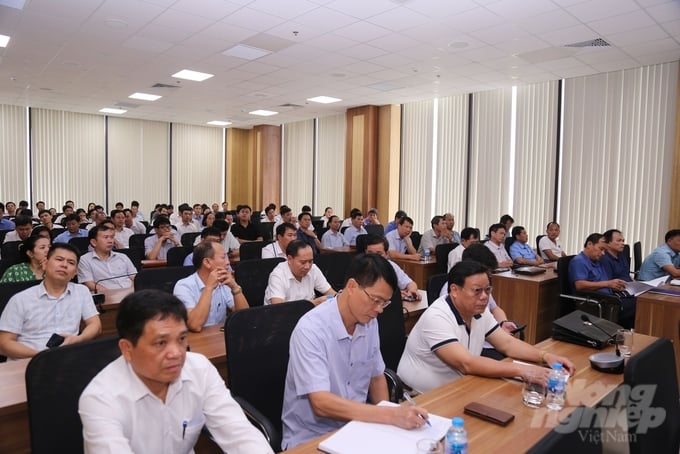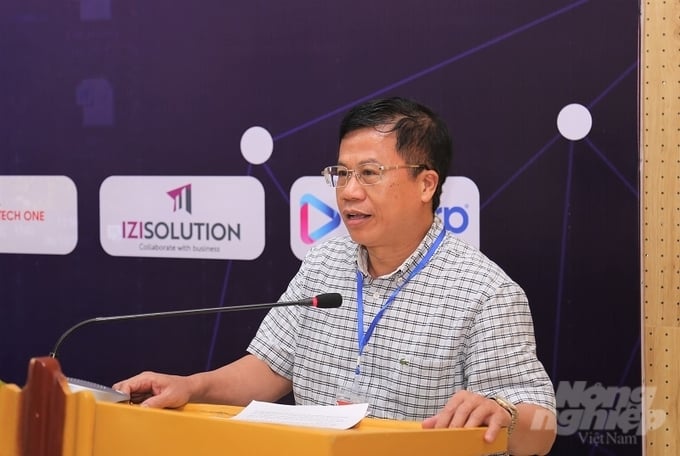June 15, 2025 | 13:53 GMT +7
June 15, 2025 | 13:53 GMT +7
Hotline: 0913.378.918
June 15, 2025 | 13:53 GMT +7
Hotline: 0913.378.918
A Webinar titled "Digital transformation in the agriculture industry toward high-tech and smart agriculture" was held in Thanh Hoa on October 6 as part of a series of activities marking the 2022 National digital transformation day.
Mr. Hoang Viet Chon, deputy director of the Department of Agriculture and Rural Development (DARD), stated during the webinar, "Agriculture plays a critical role in Vietnam's economy and remains a key sector in ensuring national food security. Digital transformation is an inevitable trend and the key to unlocking sustainable growth in the context of international integration, climate change, diseases, and the fourth industrial revolution.

Mr. Hoang Viet Chon, Deputy Director of Thanh Hoa Department of Agriculture and Rural Development. Photo: Quoc Toan.
Thanh Hoa DARD viewed the webinar as a chance for the agriculture industry to seek out innovative solutions for the province's digital transformation duties.
Mr. Tong Xuan Chinh, deputy director of the Department of Livestock Production, stated, "Digital transformation in the agricultural sector is based on three main pillars: digital government at state management agencies responsible for agriculture; digital agricultural economy; digital countryside; and digital farmer.
Vietnam's agriculture must undergo a complete digital transformation to adapt to the 4.0 technological revolution.
The Department of Livestock Production was tasked by the Ministry of Agriculture and Rural Development with deploying the database system for the management of animal feed production facilities and livestock establishments in response to the urgent needs of production practice and development orientation outlined in the livestock industry development strategy to 2030 with a vision to 2045.
Regarding livestock production specifically, Chinh stated, "Database of livestock feed and livestock facilities would support the capacity increment of state management agencies, transform the awareness and actions of individuals, enterprises, and management officials at the local level in enhancing yield, farming area, quality, and output of the products; facilitate a smooth, up-to-date, and integrated two-way information exchange between the public and agricultural management agencies; and facilitate the administrative procedure for people to register livestock production smoothly."

Overview of the seminar. Photo: Quoc Toan.
Regarding livestock production specifically, Chinh stated, "Database of livestock feed and livestock facilities would support the capacity increment of state management agencies, transform the awareness and actions of individuals, enterprises, and management officials at the local level in enhancing yield, farming area, quality, and output of the products; facilitate a smooth, up-to-date, and integrated two-way information exchange between the public and agricultural management agencies; and facilitate the administrative procedure for people to register livestock production smoothly."
Compliance with management laws in livestock production will enhance productivity, product quality, and output.

Mr. Tong Xuan Chinh - Deputy Director of the Department of Livestock Production - Ministry of Agriculture and Rural Development. Photo: Quoc Toan.
VAN had a quick interview with Mr. Tong Xuan Chinh, deputy director of the Department of Livestock Production (MARD).
What are the benefits of Thanh Hoa agriculture in adopting digital transformation, in your opinion?
The province of Thanh Hoa's political system places significant emphasis on digital development. This location also provides a significant contribution to the growth of the agricultural economy and assures food security for almost 4 million people in the province.
Thanh Hoa offers considerable incentives for the development of industry, notably the contribution of Nghi Son Refinery and Petrochemical to the state's budget. Therefore, the digital transformation of agriculture in Thanh Hoa will be more advantageous, since the industrialization and modernization processes will provide resources and assist the agricultural sector's digital transformation.
From where, in your opinion, should the digital transformation of Thanh Hoa's agriculture begin?
Numerous niches exist within the agricultural business. I agree with the Department of Agriculture and Rural Development officials' decision to embrace digital transformation in the agricultural, livestock, and fishing industries.
However, we select the basic elements of each field to prioritize implementation viability. For instance, in the fishing industry, digital transformation must be adopted for vessel management. In animal husbandry, it is vital to pick feed-producing companies, among others.
The fragmented nature of agriculture production, according to some, presents a number of obstacles for the digital transformation of agriculture. It appears that farmers' access to advanced technologies is constrained owing to a lack of knowledge and qualified basis. Can you propose some digital transformation solutions for agriculture, farmers, and rural areas?
Thanh Hoa is a small version of Vietnam. Despite this, agricultural output is scattered and on a small scale. The issue is how to digitally convert an image of agriculture that has been applied.
Farmers must join production organizations or cooperatives to achieve this. Cooperatives must adopt a digital transformation strategy, apply technology platforms to production, organize cooperative activities, and instruct farmers on how to implement scientific applications on digital platforms for production.
On the other hand, digital transformation is a significant issue, and state management agencies have limited resources for investing in the infrastructure system. But we do not know when we will take our first steps if we do not act today.

Mr. Tong Xuan Chinh - Deputy Director of the Department of Livestock Production spoke to VAN.
Therefore, for digital transformation to be successful, the political system must have a high degree of uniting resolve. While resources for investment in digital transformation infrastructure are limited, social resources must be mobilized to serve as a driving force for digital transformation.
In order to add value to sustainable agricultural goods, the federal and state governments must also have policies to assist communities with digital transformation.
What do you anticipate from the digital transformation of agriculture in Thanh Hoa in the near future?
Without haste, digital transformation must be undertaken with a clear strategy and plan. Digital transformation can only be successful if the central and local implementations are synchronized.
Thank you!
Translated by Linh Linh
![Turning wind and rain into action: [4] Bringing climate bulletins to remote and isolated areas](https://t.ex-cdn.com/nongnghiepmoitruong.vn/608w/files/linhnhp/2025/06/14/1152-z6704423696987_15fd32ffc26d590d204d520c9dac6786-nongnghiep-151141.jpg)
(VAN) The Vietnam Agriculture and Nature Newspaper interviewed Mr. Vu Thai Truong, Acting Head of Climate Change and Environment at UNDP Vietnam, to gain deeper insight into how climate bulletins are delivered to farmers.

(VAN) In Tien Giang, a high-tech shrimp farm has developed a distinctive energy-saving farming model that has yielded promising results.
![Turning wind and rain into action: [3] 300.000 farmers benefit from agro-climatic bulletins](https://t.ex-cdn.com/nongnghiepmoitruong.vn/608w/files/news/2025/06/12/e5a48259d6a262fc3bb3-nongnghiep-125122.jpg)
(VAN) The agro-climatic bulletin has become a valuable tool for farmers in the Mekong Delta. After more than five years of implementation, the initiative is gradually being expanded nationwide.
![Turning wind and rain into action: [2] Providing forecasts to the people](https://t.ex-cdn.com/nongnghiepmoitruong.vn/608w/files/news/2025/06/12/e5a48259d6a262fc3bb3-nongnghiep-103927.jpg)
(VAN) In addition to improving the quality of hydrometeorological forecasts, putting forecast bulletins into practical use is crucial for production and disaster prevention.

(VAN) Blue carbon is receiving attention for its rapid absorption capacity and vast potential. It represents a promising nature-based solution to respond to climate change.
/2025/06/11/3507-1-161904_583.jpg)
(VAN) Seagrass beds and coral reefs serve as 'cradles' that nurture life in the ocean depths, creating rich aquatic resources in Vietnamese waters.
![Turning wind and rain into action: [1] Forecasting for farmers](https://t.ex-cdn.com/nongnghiepmoitruong.vn/608w/files/news/2025/06/11/e5a48259d6a262fc3bb3-nongnghiep-111919.jpg)
(VAN) Weather is no longer just a matter of fate. Forecasts have now become an essential companion for farmers in every crop season.